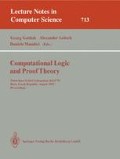Abstract
We introduce a class of First Order axiom systems which can simultaneously verify their own consistency and prove more Π1 theorems than Peano Arithmetic. Despite these strengths, our axiom systems do not violate Godel's Incompleteness Theorem because they treat multiplication as a partial function.
Partially funded by NSF 9060509.
Preview
Unable to display preview. Download preview PDF.
References
G. Boolos, The Unprovability of Consistency: An Essay on Modal Logic Cambridge University Press, 1979.
A. Bezboruah and J. Shepherdson, Godel's Second Incompleteness Theorem for Q, Journal of Symbolic Logic 41 (1976) pp. 503–512.
S. Buss, Polynomial Hierarchy and Fragments of Bounded, Proceedings of 17th Annual ACM Symposium on Theory of Computing (1985) pp. 285–290
S. Buss, Bounded Arithmetic, Princeton Ph. D. dissertation published in Proof Theory Lecture Notes #3 by Bibliopolic (1986), see also [Bu85].
S. Buss, private communications.
H. Enderton A Mathematical Introduction to Logic Academic Press 1972.
S. Feferman, Arithmetization of Metamathematics in a General Setting, Fundamenta Mathematicae 49 (1960) pp. 35–92.
S. Feferman, Finitary Inductively Presented Logics, in Proceedings of Logic Colloquium 88, North Holland Publishing House (1989) pp. 191–220.
M. Fitting, First Order Logic and Automated Theorem Proving, Springer Verlag Monograph in Computer Science, 1990.
G. Gentzen Collected Papers, translated by M.E. Szabo, North Holland, 1969.
K. Godel, Uber formal unentscheidbare Satze der Principia Mathematica und verwandter Systeme, I, Monatsh Math Phys, 38, (1931) pp. 173–198.
D. Hilbert and B. Bernays, Grundlager der Mathematik Volume 1 (1934) and Volume 2 (1939), Springer.
R. Jeroslow, Consistency Statements in Formal Mathematics, Fundamentae Mathematicae 51 (1971) pp. 17–40.
G. Kriesel, A Survey of Proof Theory, Part I in Journal of Symbolic Logic 33 (1968) pp. 321–388 (see especially footnote 8 and page 349); Part II in Proceedings of Second Scandinavian Logic Symposium (1971) North Holland Press (with Fenstad ed.), Amsterdam (see especially pp. 117(d) & 166).
G. Kriesel and G. Takeuti, Formally self-referential propositions for cut-free classical analysis and related systems, Dissertations Mathematica 118, 1974 pp. 1–55.
M. Lob, Solution of a Problem of Leon Henkin, Journal of Symbolic Logic 20 (1955) pp. 115–118.
E. Mendelson, Introduction to Mathematical Logic, Wadsworth & Brooks/Cole Mathematics Series, 1987.
H. Rogers, Theory of Recursive Functions and Effective Compatibility, McGraw Hill 1967, see especially pp. 186–188.
H. Schwichteberg, Proof Theory: Some Applications of Cut Elimination, in Handbook on Mathematical Logic, North Holland Publishing House (1983) pp. 867–896.
R. Statman, Herbrand's theorem and Gentzen's Notion of a Direct Proof, in Handbook on Mathematical Logic, North Holland Publishing House (1983) pp. 897–913.
R. Smullyan, The Theory of Formal Systems, Princeton University Press, 1961.
R. Smullyan, First Order Logic, Springer-Verlag, 1968.
C. Smorynski, The Incompleteness Theorem Handbook on Mathematical Logic, pp. 821–866, 1983.
G. Takeuti, On a Generalized Logical Calculus, Japan Journal on Mathematics 23 (1953) pp. 39–96.
G. Takeuti, Proof Theory, Studies in Logic Volume 81, North Holland, 1987.
D. Willard, Quasi-Linear Algorithms for Processing Relational Calculus Expressions, Proc of ACM's PODS-1990 Conf, pp 243–257. This reference may be helpful as an optimization technique to help render an efficient computer implementation of IS. (Much further optimization will clearly be greatly needed.)
D. Willard, Self-Verifying Axiom Systems and their Implications, (the unabrideged version of the present article), SUNY-Albany Tech Report, 1993.
Author information
Authors and Affiliations
Editor information
Rights and permissions
Copyright information
© 1993 Springer-Verlag Berlin Heidelberg
About this paper
Cite this paper
Dan Willard, E. (1993). Self-verifying axiom systems. In: Gottlob, G., Leitsch, A., Mundici, D. (eds) Computational Logic and Proof Theory. KGC 1993. Lecture Notes in Computer Science, vol 713. Springer, Berlin, Heidelberg. https://doi.org/10.1007/BFb0022580
Download citation
DOI: https://doi.org/10.1007/BFb0022580
Published:
Publisher Name: Springer, Berlin, Heidelberg
Print ISBN: 978-3-540-57184-1
Online ISBN: 978-3-540-47943-7
eBook Packages: Springer Book Archive

